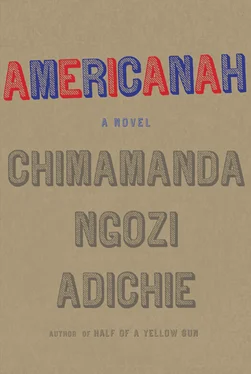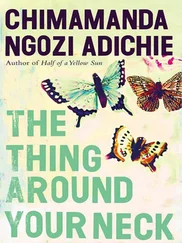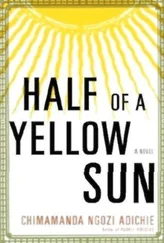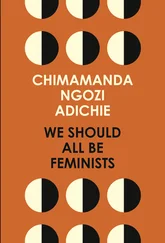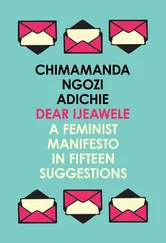Mervin Smith was upbeat and chatty. He talked, as he drove, about how hot it was, how rolling blackouts were sure to come.
“This is the kind of heat that kills old folks. If they don’t have air-conditioning, they have to go to the mall, you know. The mall is free air-conditioning. But sometimes there’s nobody to take them. People have to take care of the old folks,” he said, his jolly mood unfazed by Ifemelu’s silence.
“Here we are!” he said, parking in front of a shabby block. The salon was in the middle, between a Chinese restaurant called Happy Joy and a convenience store that sold lottery tickets. Inside, the room was thick with disregard, the paint peeling, the walls plastered with large posters of braided hairstyles and smaller posters that said QUICK TAX REFUND. Three women, all in T-shirts and knee-length shorts, were working on the hair of seated customers. A small TV mounted on a corner of the wall, the volume a little too loud, was showing a Nigerian film: a man beating his wife, the wife cowering and shouting, the poor audio quality jarring.
“Hi!” Ifemelu said.
They all turned to look at her, but only one, who had to be the eponymous Mariama, said, “Hi. Welcome.”
“I’d like to get braids.”
“What kind of braids you want?”
Ifemelu said she wanted a medium kinky twist and asked how much it was.
“Two hundred,” Mariama said.
“I paid one sixty last month.” She had last braided her hair three months ago.
Mariama said nothing for a while, her eyes back on the hair she was braiding.
“So one sixty?” Ifemelu asked.
Mariama shrugged and smiled. “Okay, but you have to come back next time. Sit down. Wait for Aisha. She will finish soon.” Mariama pointed at the smallest of the braiders, who had a skin condition, pinkish-cream whorls of discoloration on her arms and neck that looked worryingly infectious.
“Hi, Aisha,” Ifemelu said.
Aisha glanced at Ifemelu, nodding ever so slightly, her face blank, almost forbidding in its expressionlessness. There was something strange about her.
Ifemelu sat close to the door; the fan on the chipped table was turned on high but did little for the stuffiness in the room. Next to the fan were combs, packets of hair attachments, magazines bulky with loose pages, piles of colorful DVDs. A broom was propped in one corner, near the candy dispenser and the rusty hair dryer that had not been used in a hundred years. On the TV screen, a father was beating two children, wooden punches that hit the air above their heads.
“No! Bad father! Bad man!” the other braider said, staring at the TV and flinching.
“You from Nigeria?” Mariama asked.
“Yes,” Ifemelu said. “Where are you from?”
“Me and my sister Halima are from Mali. Aisha is from Senegal,” Mariama said.
Aisha did not look up, but Halima smiled at Ifemelu, a smile that, in its warm knowingness, said welcome to a fellow African; she would not smile at an American in the same way. She was severely cross-eyed, pupils darting in opposite directions, so that Ifemelu felt thrown offbalance, not sure which of Halima’s eyes was on her.
Ifemelu fanned herself with a magazine. “It’s so hot,” she said. At least, these women would not say to her “You’re hot? But you’re from Africa!”
“This heat wave is very bad. Sorry the air conditioner broke yesterday,” Mariama said.
Ifemelu knew the air conditioner had not broken yesterday, it had been broken for much longer, perhaps it had always been broken; still she nodded and said that perhaps it had packed up from overuse. The phone rang. Mariama picked it up and after a minute said, “Come now,” the very words that had made Ifemelu stop making appointments with African hair braiding salons. Come now, they always said, and then you arrived to find two people waiting to get micro braids and still the owner would tell you “Wait, my sister is coming to help.” The phone rang again and Mariama spoke in French, her voice rising, and she stopped braiding to gesture with her hand as she shouted into the phone. Then she unfolded a yellow Western Union form from her pocket and began reading out the numbers. “Trois! Cinq! Non, non, cinq!”
The woman whose hair she was braiding in tiny, painful-looking cornrows said sharply, “Come on! I’m not spending the whole day here!”
“Sorry, sorry,” Mariama said. Still, she finished repeating the Western Union numbers before she continued braiding, the phone lodged between her shoulder and ear.
Ifemelu opened her novel, Jean Toomer’s Cane , and skimmed a few pages. She had been meaning to read it for a while now, and imagined she would like it since Blaine did not. A precious performance, Blaine had called it, in that gently forbearing tone he used when they talked about novels, as though he was sure that she, with a little more time and a little more wisdom, would come to accept that the novels he liked were superior, novels written by young and youngish men and packed with things , a fascinating, confounding accumulation of brands and music and comic books and icons, with emotions skimmed over, and each sentence stylishly aware of its own stylishness. She had read many of them, because he recommended them, but they were like cotton candy that so easily evaporated from her tongue’s memory.
She closed the novel; it was too hot to concentrate. She ate some melted chocolate, sent Dike a text to call her when he was finished with basketball practice, and fanned herself. She read the signs on the opposite wall — NO ADJUSTMENTS TO BRAIDS AFTER ONE WEEK. NO PERSONAL CHECKS. NO REFUNDS — but she carefully avoided looking at the corners of the room because she knew that clumps of moldy newspapers would be stuffed beneath pipes and grime and things long rotten.
Finally, Aisha finished with her customer and asked what color Ifemelu wanted for her hair attachments.
“Color four.”
“Not good color,” Aisha said promptly.
“That’s what I use.”
“It look dirty. You don’t want color one?”
“Color one is too black, it looks fake,” Ifemelu said, loosening her headwrap. “Sometimes I use color two but color four is closest to my natural color.”
Aisha shrugged, a haughty shrug, as though it was not her problem if her customer did not have good taste. She reached into a cupboard, brought out two packets of attachments, checked to make sure they were both the same color.
She touched Ifemelu’s hair. “Why you don’t have relaxer?”
“I like my hair the way God made it.”
“But how you comb it? Hard to comb,” Aisha said.
Ifemelu had brought her own comb. She gently combed her hair, dense, soft, and tightly coiled, until it framed her head like a halo. “It’s not hard to comb if you moisturize it properly,” she said, slipping into the coaxing tone of the proselytizer that she used whenever she was trying to convince other black women about the merits of wearing their hair natural. Aisha snorted; she clearly could not understand why anybody would choose to suffer through combing natural hair, instead of simply relaxing it. She sectioned out Ifemelu’s hair, plucked a little attachment from the pile on the table, and began deftly to twist.
“It’s too tight,” Ifemelu said. “Don’t make it tight.” Because Aisha kept twisting to the end, Ifemelu thought that perhaps she had not understood, and so Ifemelu touched the offending braid and said, “Tight, tight.”
Aisha pushed her hand away. “No. No. Leave it. It good.”
“It’s tight!” Ifemelu said. “Please loosen it.”
Mariama was watching them. A flow of French came from her. Aisha loosened the braid.
“Sorry,” Mariama said. “She doesn’t understand very well.”
Читать дальше
